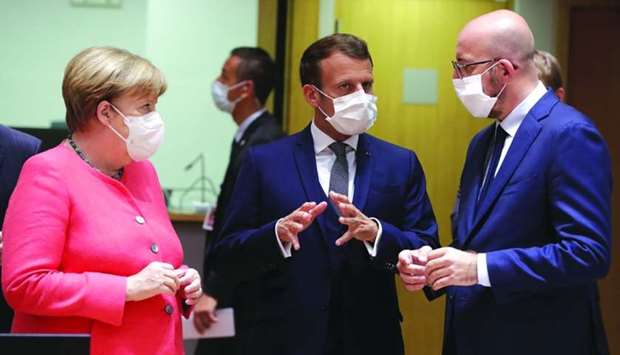* 27 EU heads meet for first face-to-face talks since lockdowns
* Pressure for deal is huge but major differences remain
* Czech PM thinks there will not be a deal at summit
* Pressure for deal is huge but major differences remain
* Czech PM thinks there will not be a deal at summit
European Union leaders' views on a mass stimulus plan remained "diametrically different", Czech Prime Minister Andrej Babis said yesterday, after hours of talks on how to breathe life into economies ravaged by the coronavirus pandemic.
The 27 EU heads are struggling to close ranks on the bloc's 2021-27 budget, proposed at above 1tn euros, and a linked new recovery fund worth 750bn euros, meant to help rebuild southern economies most affected by the pandemic.
"The opinions on the size of the recovery fund are diametrically different," Babis told reporters as the leaders took a break in their all-day talks. "We will see if we even get to some agreement today, I rather think that we will not."
"So far I don't have the feeling we are getting closer to an agreement, I rather have the opposite feeling."
Despite displays of bonhomie at the start of their first face-to-face talks in five months in Brussels, the 27 remained at odds over the overall size of the package, the special recovery fund and its split between free grants and repayable loans, budget rebates for five rich net payers, vetting procedures to access aid and rule of law strings attached to it.
Dutch Prime Minister Mark Rutte led the thrifty camp of northern, wealthy states including Denmark, Austria, Finland and Sweden, facing off against Germany, France, the ailing southerners Italy and Spain, as well as Poland and eastern peers.
"If they want loans and even grants then I think it's only logical that I can explain to people in the Netherlands...that in return those reforms have taken place," Rutte said, in estimating chances for a deal at a modest fifty-fifty.
A Spanish government source said The Hague was alone in demanding a de-facto veto on national plans to win recovery funds and that the frugal camp was pushing to bring the budget down to 1.05tn euros from 1.074 discussed so far.
German Chancellor Angela Merkel, who celebrated her 66th birthday yesterday in Brussels, was also cautious on chances for an agreement, envisaging "very, very difficult negotiations".
After initial elbow bumps between the 27 — all wearing face masks — and birthday gifts for Merkel and Portuguese Prime Minister Antonio Costa, tense meetings followed in the evening with Rutte and Hungarian Prime Minister Viktor Orban.
Orban — who stands accused by critics of tightening the noose around media, academics and NGOs — threatened to veto the entire plan over a new mechanism envisaged to freeze out countries undercutting democratic standards.
Austrian Chancellor Sebastian Kurz said yesterday he rejected the current proposal for a mass economic stimulus to help lift EU economies from recession brought by the coronavirus pandemic.
"Our most important central demand is that there should be no long-term debt union but that what is decided here remains a one-time action," Kurz told broadcaster ORF.
With EU economies in free fall, and immediate relief measures such as short-time work schemes running out this summer, the spectre of an autumn of deep economic malaise and discontent is looming.
The EU is already grappling with the protracted saga of Britain's exit from the bloc and bruised by past crises, from the financial meltdown of 2008 onwards to feuds over migration.
Another economic shock could expose it to more eurosceptic, nationalist and protectionist forces, and weaken its standing against China, the United States or Russia.
"The stakes couldn't be higher," European Commission President Ursula von der Leyen said yesterday. "The whole world is watching us."

